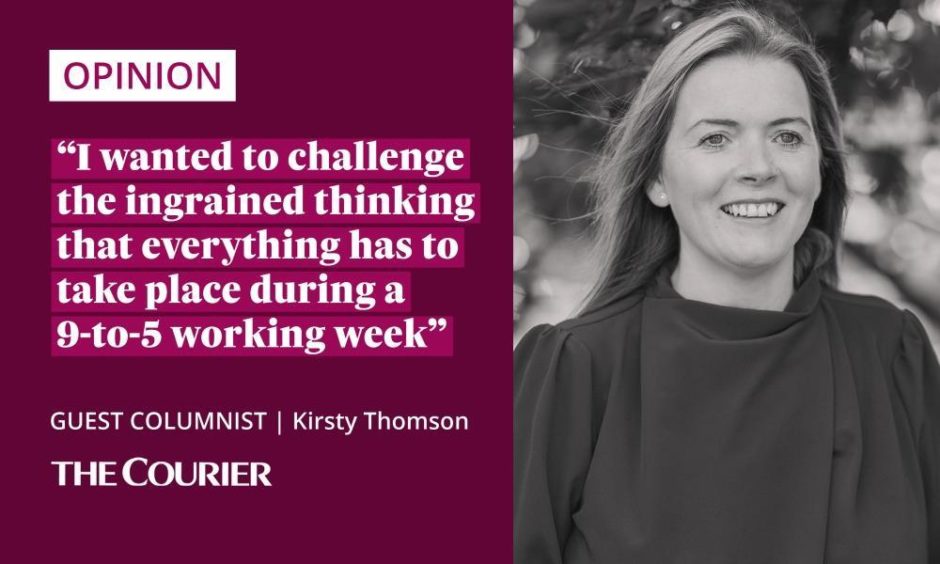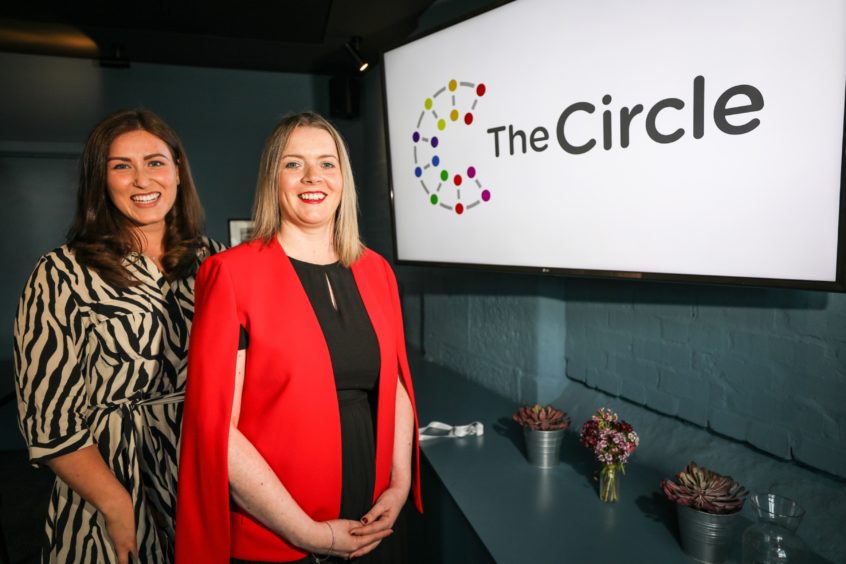A four-day working week for Scots took a step closer this weekend as SNP members voted in its favour.
A £10 million fund will now be set up to allow companies to pilot and explore the benefits.
Dundee social enterprise The Circle introduced its own four-day week during the pandemic.
Here, founder and CEO Kirsty Thomson explains how it has worked for them.

For us, the decision to reduce the number of working days came after seeing what the team had been able to achieve during the lockdown period.
It began as an occasional, complimentary Friday off during the initial high-stress months of the Covid-19 pandemic.
But when we saw staff energy levels rocket after a long weekend, we decided it was time to finally try it.
Work-life balance and staff wellbeing has always been a priority for us, but during lockdown we had to be even more mindful of this.
By having reduced working days our staff can achieve just as much while having more time for themselves.
People appreciate that extra day to focus on their wellbeing and say they are achieving so much because they are more motivated and energised.
Don’t be afraid to challenge norms
In social enterprise we’re able to challenge convention, and to say ‘how can we do things a little bit differently?’
We are always thinking about ways we can better serve both employees and beneficiaries through innovation.
I really believe those of us working in social enterprise and charity sector need to think as much about our staff teams as well as the beneficiaries of our services if we want to make the difference in our communities that we strive for.
EVENT ANNOUNCEMENT: Implementing a four-day week in the Charity and NGO sector – with @STOPAIDS @youngwomenscot @TheCircle_CIC @Autonomy_UK https://t.co/e3XOkP4ieP
— 4 Day Week Campaign (@4Day_Week) September 7, 2021
I wanted to challenge the ingrained thinking that everything has to take place during a 9-to-5 working week.
As a society we’ve got into this the way of constantly responding to an email the minute it drops in the inbox on weekends and evenings.
We glorify long days and admire high stress work culture as the boundaries between our personal and professional lives erode.
But there is a huge amount of research to show this just leads to burnout, more sick days and an unhealthy work life balance which takes taking its toll on mental and physical health.
Not sure about a four day week? Try it
The Circle closed temporarily in March 2020, with limitations on what services it could deliver and a number of staff went on furlough.
We still managed to achieve so much during that period and this was our incentive to trial a four-day week from October to December 2020.
It was a chance to see how it would work operationally, how staff would respond, and – importantly – to build a case to take to our Board of Directors for approval.
A pilot is an opportunity to learn lessons and take those forward in a way that works for your organisation.
We didn’t do it but I would suggest tracking sickness, absentee levels, retention rates, new hires, turnover etc.
Implementation takes time and planning
The Circle staff are on rotating shifts so people are off on different days – generally a Monday and Friday.
Employees who have caring responsibilities and need a more fixed timetable are offered more regular days.
Big team meetings take place mid-week when the majority are working.
The 35-hour working week has now been reduced to 32 hours, so staff end up working for roughly 30 minutes extra per day, but salaries have stayed the same.
Be transparent about four day week
We made it clear to everyone we work with that we had transitioned into a four-day working week.
Employees are encouraged to put their out-of-office email on during their “resting days”. But there will always be someone to speak to.
Being open is key. Keep talking to your staff and make sure it still works for them.
I am still checking in with staff to understand how the transition is settling in. And they know I’m not just looking for confirmation of success.
We need to be prepared to see when it isn’t working, and why, and how we can do things differently.
Well this has set us up for the weekend! A beautiful snippet of what we do here at The Circle. Carefully crafted by @sonofthesea8 and @avianstudio to offer you a sneak peek of what’s to come with our brand new website designed by @blue2digital #TheCircle #MoreThanProfit pic.twitter.com/Jj1vi44e39
— The Circle (@TheCircle_CIC) August 20, 2021
This does take another layer of planning and as with any organisation, it doesn’t always work out.
Right now people being off on certain days can impact communication. This is something we are working on to ensure we get it right for everyone – staff and clients.
It’s part of the process and it won’t always go smoothly.
A four-day week might not work for everyone.
There are implications on business, income, staff shortages, logistics and it won’t always be straightforward.
And be prepared for it to work
But our turnover actually increased last year .
We can’t be certain it’s down to the four-day week. But our staff tell me they are generally happier and healthier.
They also say the new structure is helping them to have a better work-life balance – which may make them more productive during working hours.
There’s been an overwhelmingly positive response in terms of what having an extra day has allowed them to achieve in their personal lives.
It’s changed everyone’s quality of life.
You’re a whole person when you come to work at The Circle, you’re not just a person that works here.
Kirsty Thomson is founder and CEO of Dundee-based social enterprise The Circle. She will be talking about the group’s four-day week experience at an event later this month.











